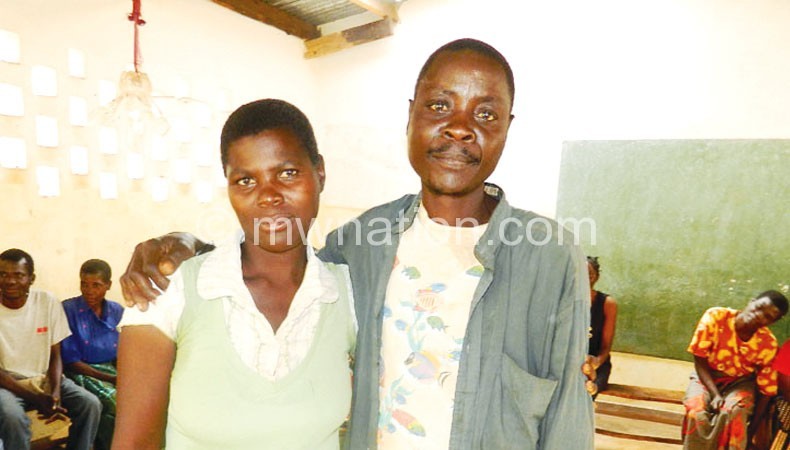Cowhla’s Stepping Stone reducing IPV
The scourge of intimate partner violence (IPV), notes Steve Iphani, programme manager of Coalition of Women Living with HIV and Aids (Cowlha), lies in the fact that it prevents women from living full lives and taking part in society throughout their life cycle.
“With increased IPV,” he continues, “it becomes difficult to gain national development and eradicate extreme poverty if women do not have opportunities to influence their own lives.”

Reducing and eradicating IPV, hence, is no longer a question of debate. It is a priority. This is why the Malawi Government, as early as 2004, identified eradication of violence against women as one of the strategies towards attaining poverty reduction.
Driven by this, Cowlha, with a grant from the UN Trust Fund (UNTF) to End Violence against Women, rolled out a project titled Leveraging Positive Action towards Reducing Violence Against Women Living with HIV.
Through the project, Cowlha found that lack of communication between couples, coupled by low economic status of women, was among the key factors fuelling IPV.
To combat this, Cowlha used a strategy known as Stepping Stones which, according to Iphani, entails putting couples in groups and training them to open up to each other on issues of sexuality.
The objective, says Iphani, is to encourage openness in marriage so that couples can discuss issues and in the process reduce gender-based violence (GBV).
“There is need to have a discussion and an agreement before having sex as at times a spouse can be refusing sex with a valid reason,” he says.
He adds that it is through the discussion that dos and don’ts can be agreed, thereby promoting peace in the home and the world at large.
To ensure that a lot of people are reached out, Cowlha has deliberately included men in its activities as it will help to root out GBV which is the ultimate project.
One of the men was Amin Kudu of Balaka, the husband of Chrissy who ran away after finding out that his wife was diagnosed with HIV.
Amin returned three years later to start all over with Chrissy who accepted him back on condition that he too goes for an HIV test which he accepted and consequently was also found HIV positive.
However, after reuniting, the couple faced a serious challenge of using condoms.
Chrissy says the husband showed great resistance to condom use despite several attempts to enlighten him that the viruses would be multiplying every time they have unprotected sex.
“It was a risky move that my husband was taking and his arrogance could have led to our early grave,” said Chrissy.
According to Chrissy, the turning point was when Stepping Stones training was introduced in the area which imparted skills that helped to convince the husband that it was important to use condoms when having sex.
“Disagreements on condom use are a thing of the past as we are a happy couple that consistently use condoms considering our HIV status,” says the husband.
Amin’s brother, Kennedy and his wife Elizabeth from Kalitsiro Village T/A Nsomba in the same district said fights ensued whenever they wanted to have sex as the wife preferred using a condom while the husband wanted unprotected sex.
“My husband used to beat me up when I refused to have unprotected sex, yet I was doing it for our common good. Stepping Stones has helped us to come to a consensus and we are all happy now,” says Elizabeth.
According to Cowlha executive director Annie Banda, the project is being implemented in 12 districts of Lilongwe, Ntchisi, Salima, Dedza, Nkhata Bay, Mzimba, Karonga, Rumphi, Blantyre, Balaka, Thyolo and Nsanje.
“The project seeks to reduce IPV by among other things ensuring men’s active participation in interventions aimed at eliminating GBV.
“The main strategy of engaging men is through use of the Stepping Stones approach that allows men and women to dialogue and communicate on issues of relevance to IPV violence,” she says.
Amos Stewart from Michesi Village in T/A Kalembo’s area in Balaka is one of the men who participated in Stepping Stones.
“There was lack of openness in the home with my wife as we could not express our feelings and expectations to each other which led to disagreements,” he says.
He says by understanding the needs of your spouse, you are likely to make her happy, thereby reducing conflicts.
Stewart disclosed that sex is now done anytime of the day in an open manner unlike in the past when it was only done at night afraid of seeing each other’s privacy.
“Sex life has become more exciting as we are putting into practice what we learnt in groups facilitated by Cowlha,” says Stewart.
Stewart’s wife Patricia acknowledged that in the absence of knowledge, it is hard to distinguish punishment from GBV.
“After undergoing Stepping Stones training they have realised that issues can be discussed and come to an amicable end as failure to open up to each other can lead to unfaithfulness,” she advised.
Christina Moyenda said information shared during Stepping Stones meetings has helped to revive valuable moments in marriages.
“We now act like a newly-wed couple. We have a lot of fun as a family. We are thankful to Cowlha for initiating the programme that is helping to promote love,” says Moyenda.
Elizabeth Njeula, Balaka Cowlha coordinator observes that a lot of people that have been reached have received the messages with open arms.
“Despite few people shunning the messages in public as they are considered a taboo, a lot of people appreciate that the information is of great importance in their homes,” said Njeula.





